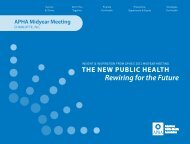EVIDENCE
missingevidence-digitalpdf-singlepages_2016
missingevidence-digitalpdf-singlepages_2016
You also want an ePaper? Increase the reach of your titles
YUMPU automatically turns print PDFs into web optimized ePapers that Google loves.
3.36 Department of Health only considers studies that meet internationally recognised standards<br />
as research. This means that consultancy and other forms of external work are excluded from<br />
publication rules.<br />
3.37 This dichotomy is reflected in research contracts. It appears that restrictions on what can be published<br />
generally only apply to commercially sensitive or personal information, which cannot in principle<br />
be objectionable. Witnesses stated that the usual form of words is that permission to publish<br />
“shall not be unreasonably withheld”.<br />
3.38 Some contracts also restrict the timing of researchers’ ability to publish, for instance by asking<br />
for a month’s prior notice. If a reasonably short time to receive and read commissioned research<br />
is specified in advance and does not result in the public being asked to trust a policy based<br />
on results it cannot see, this would not, and should not, usually be considered a delay in publication.<br />
The acceptability of this short reading time within the definition of prompt publication might address<br />
some of the concerns in submissions raised here and in Section 4 about transparency discouraging<br />
the commissioning of research in the first place.<br />
3.39 Attention has been drawn to contracts, such as the one in place for the food banks research<br />
in Case Study 6, which suggest that departments own the results and can prevent publication without<br />
giving reasons. It is unclear whether this is widespread practice and it needs to be clarified that research<br />
contracts are subject to overriding principles and protocols regarding publication.<br />
3.40 While pilots and randomised controlled trials are increasingly being used to test policies,<br />
some departments and agencies appear reluctant to publish the methods and results.<br />
This has created tension, where those inside and outside government who are committed to standards<br />
of full and prompt publication face a choice of conducting trials knowing that they may not get published,<br />
or insisting on publication with the risk that departments withdraw support for the trials. Researchers<br />
wishing to scrutinise the trials sometimes request the data under the Freedom of Information Act<br />
as a last resort, but these do not always result in full disclosure and are not a substitute for publication.<br />
However, witnesses in this inquiry also said that the ‘What Works’ collaborations, such as in education,<br />
have shown that trial results can be published and handled well.<br />
29 SECTION 3: REASONS FOR THE DELAYED PUBLICATION OR WITHHOLDING OF GOVERNMENT RESEARCH



